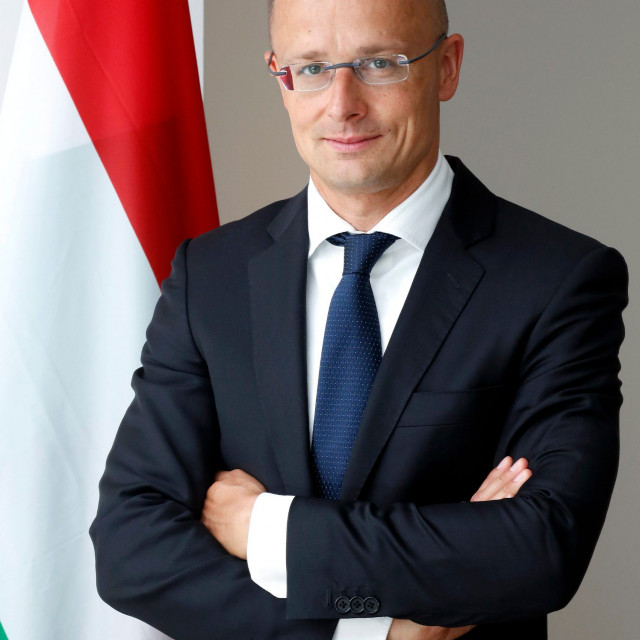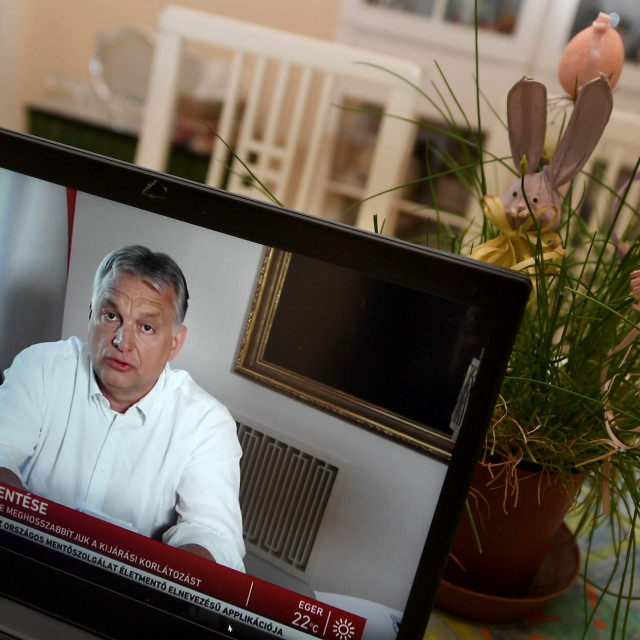
On March 30, 2020, the Hungarian Parliament adopted a text that allows the government to suspend the enforcement of certain laws, depart from provisions enshrined in the existing ones and implement additional extraordinary measures by decree for a practically unlimited period of time, with new limitations on media and information.
Such a concentration of power is unprecedented in the European Union. It does not serve the fight against Covid-19 or its economic consequences; instead, it opens the door to all types of abuses, with both public and private assets now at the mercy of an executive that is largely unaccountable. It is the culmination of Hungary’s 10-year drift towards authoritarianism, and it is dangerous.
Indeed, it is with great concern that we observed Prime Minister Viktor Orbán embark his country on a track diverging from European norms and values over the last decade. This power-grab in response to Covid-19 is just a new and alarming chapter in a long process of democratic backsliding.
Political opposition, social dialogue, and free speech have increasingly been silenced, with various universities, cultural hubs, business groups and civil society organisations suffering the burden of Mr. Orbàn’s authoritative rule.
The European Parliament has twice analysed and condemned this undemocratic drift with the Tavares and Sargentini reports in 2013 and 2018 respectively.
For those who believe in the values of rule of law and democratic government, inaction is not an option. The Union risks discrediting all its efforts to foster democratic processes, the rule of law, transparency, solidarity, and social dialogue not only in all Member States but amongst candidate countries as well.
To face this generation-defining pandemic, all EU countries must adopt difficult measures that, to some extent, limit their citizens’ civil rights. However, these measures should remain proportionate and justified, and temporary in nature.
Enabling the rule by government decrees for a practically unlimited time, is a severe violation of EU Treaties, of the Charter of Fundamental Rights, and of the European Convention on Human Rights.
That is why, denouncing and sanctioning Mr. Orbán’s attack on democracy is more crucial today than ever.
We therefore call on all stakeholders - European institutions, national institutions and governments, citizens, civil society, and the media - to be as vigilant as they can. It is time for widespread mobilisation and collective action.
We call on national media to dedicate news segments to the Hungarian situation, daily if needs be. We also ask them to grant Hungarian citizens, as European citizens, free access to their content as a source of pluralistic and independent information.
We call on the Commission, as guardian of the Treaties, to urgently react and propose sanctions proportional to the seriousness of such an unacceptable violation of European rules and values.
The European Parliament and the Council should adopt these sanctions without delay.
Covid-19 must and will be beaten thanks to democratic processes, transparent action, and pluralistic information. It is by defending these values that we will mobilise the European population at large and ensure our common road to recovery enjoys widespread support.
We finally call on all European citizens to look at what is happening in Hungary not as an externality but as a fundamental threat to our common interest.
It is time for all of us to unite in this fight. What is at stake is not only our health, but our shared ideals, and the survival of our Union and democracies.
At the initiative of CIVICO Europa Members:
Laszlo Andor (HU), Economist, former Member of the European Commission
Guillaume Klossa (FR), Co-President of CIVICO Europa, former Director of the European Broadcasting Union, former Sherpa to the reflection group on the future of Europe (European Council)
Francesca Ratti (IT), Co-President of CIVICO Europa, former Deputy Secretary General of European Parliament
Guy Verhofstadt (BE), MEP, former Prime Minister
With the Civico Europa contributors (full list on www.civico.eu):
Gian-Paolo Accardo (IT), Editor in chief of VoxEurop
Brando Benifei (IT), MEP
Carl Bildt (SW), former Prime Minister
Andras Bozoki (HU), Professor, former Minister of Culture
Jean-Pierre Bourguignon (FR), mathematician, former President of the European Research Council
Franziska Brantner (DE), MP, former MEP
Saskia Bricmont (BE), MP
Philippe de Buck (BE), former DG Business Europe
Jasmina Cibic (SLO), Artist
Tremeur Denigot (FR), Director of communications CIVICO Europa
Mladen Dolar (SLO), Philosopher
Paul Dujardin (BE), BOZAR Director General
Pascal Durand (FR), MEP
Uffe Ellemann-Jensen (DK), former Minister of Foreign Affairs
Michele Fiorillo (IT), Philosopher, Responsible for civic movements network CIVICO Europa
Cynthia Fleury (FR), Philosopher, Psychoanalyst
Markus Gabriel (DE), Philosopher
Sandro Gozi (IT), MEP, President of the European Federalist Union, former Secretary of State for European Affairs
Ulrike Guerot (DE), Political scientist
David Harley (UK), Writer, former Deputy Secretary General of the European Parliament
Gabor Horvat (HU), Journalist
Srecko Horvat (HR), Philosopher
Danuta Hübner (PL), MEP, former Member of the European Commission
Tvrtko Jakovina (HR), Historian
Miljenko Jergovic (HR), writer and journalist
Jean-Claude Juncker (LU), former Prime Minister, former President of the European Commission
Jyrki Katainen (FI), former Prime Minister, former Vice-president of the European Commission
Aleksander Kwasniewski (PL), former President of the Republic
Christophe Leclercq (FR), Founder Euractiv
Christian Leffler (SE), former Deputy Secretary General of the European External Action Service
Sándor Léderer (HU), Co-founder and Director of K-Monitor
Bernard-Henri Lévy (FR), Philosopher
Sven-Otto Littorin (SE), former Minister for Employment
Cecilia Malmström (SE), former member of the European Commission
Henri Malosse (FR), 30th President of the European Economic and social Committee
Joelle Milquet (BE), former special Adviser of the President of the European Commission, former Deputy Prime Minister
Alexandra Mitsotaki (GR), President of the World Human Forum
Carlos Moedas (PT), former Member of the European Commission
John Monks (UK), Member of the House of Lords, former Secretary general of the European Trade Union Conference
Jonathan Moskovic (BE), Adviser in democratic innovation
Niklas Nordstrom (SE), former Mayor of Lulea and former Chairman of Business Sweden
Stojan Pelko (SLO), former State Secretary for culture
Rosen Plevneliev (BU), former President of the Republic
Magali Plovie (BE), President of the French-speaking Brussels Parliament
Miguel Poiares Maduro (PT), former Minister for Regional Development
Vesna Pusic (HR), Sociologist, MP, former Deputy Prime Minister and former Minister of Foreign Affairs
Nina Rawal (SE), Entrepreneur
Michel Reimon (AT), former MEP
Maria Joao Rodrigues (PT), former Minister, former MEP, President of the Foundation for European Progressive Studies (FEPS)
Petre Roman (RO), former Prime Minister
Taavi Roivas (EST), former Prime Minister
Lavinia Sandru (RO), Journalist
Fernando Savater (ESP), Philosopher
Roberto Saviano (IT), Writer, journalist
Seid Serdarević (HR) publisher | Fraktura
Majda Sirca (SLO), former Minister for Culture
Denis Simonneau (FR), President of EuropaNova
Claus Sorensen (DK), former Director General at the European Commission
Gesine Schwan (DE), former Dean of the Frankfurt Viadrina University, former candidate to presidency of the Federal German Republic
Vladimir Spidla (CZ), former Prime Minister, former Member of the European Commission
Farid Tabarki (ND), Journalist, producer
Rui Tavares (PT), Writer, historian, former MEP
Zeljko Trkanjec (HR), Editor in Chief of Euractiv.hr
Monika Vana (AT), MEP
Alvaro de Vasconcelos (PT), former Director of the European Union Security
Institute
Cédric Villani (FR), Fields Medal, MP
Pietro Vimont (FR), Cofounder of CIVICO Europa
rMargot Wallstrom (SW), former vice-president of the European Commission
Sasha Waltz & Jochen Sanding (DE), respectively Choreographer and Director of the Sasha Waltz Company
Josef Weidenholzer (AT), Professor, former MEP
Marlene Wind (DK), Professor, writer
Slavoj Zizek (SLO), Philosopher
Alenka Zupancic (SLO), Philosopher





Za sudjelovanje u komentarima je potrebna prijava, odnosno registracija ako još nemaš korisnički profil....